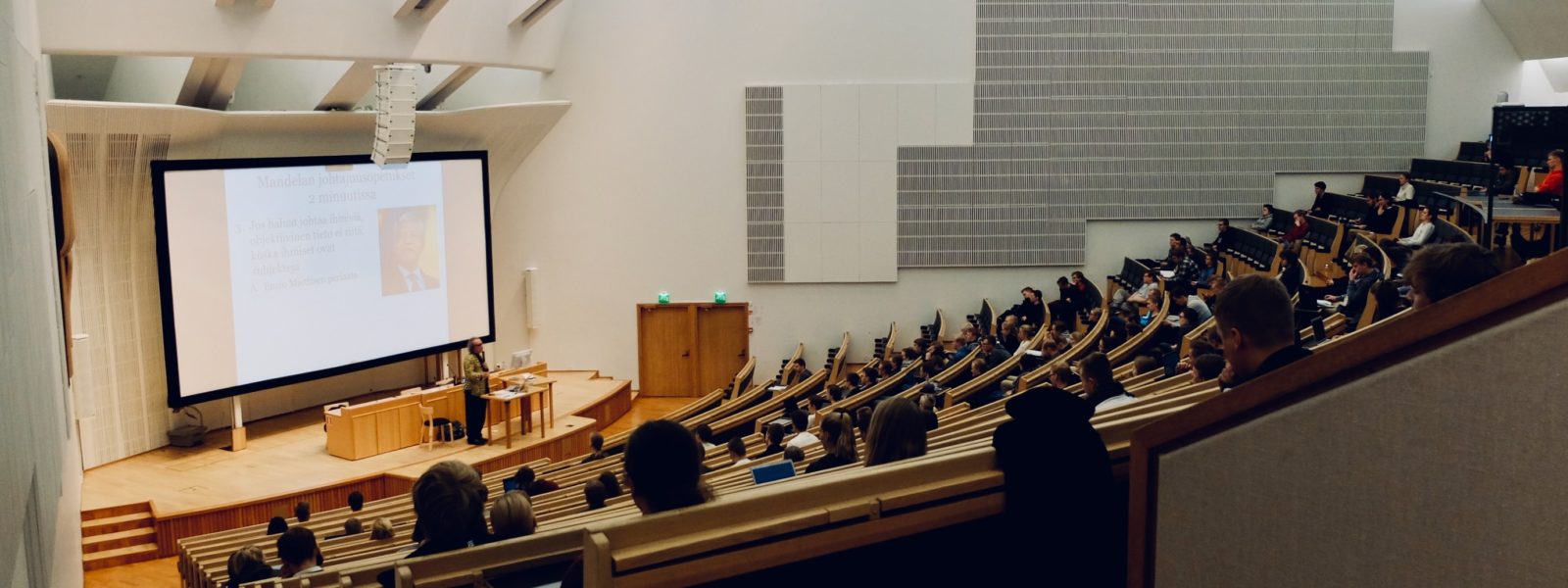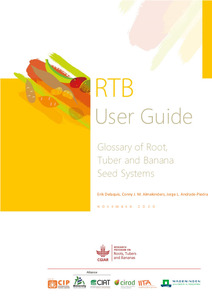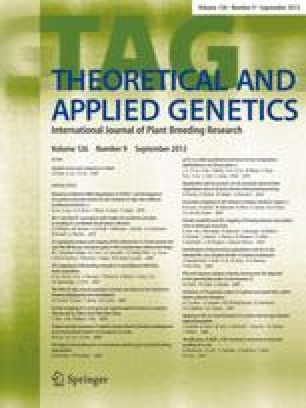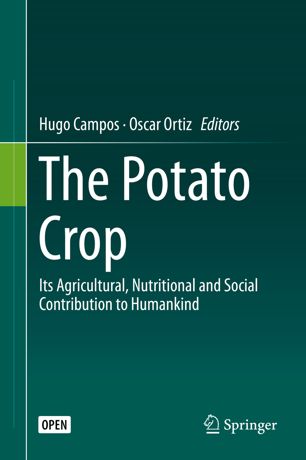The CGIAR Research Program on Roots, Tubers and Bananas (RTB) has a strong and close working relationship with Wageningen University and Research (WUR) in the Netherlands. As we move towards One CGIAR, RTB looks back on a fruitful collaboration and forward to good things to come.
The CGIAR Research Program on Roots, Tubers and Bananas (RTB) and collaborators from Wageningen University and Research (WUR) in the Netherlands have enjoyed a long and productive partnership.
Cees Leeuwis, professor of Knowledge, Technology and Innovation at WUR, regards the partnership with RTB as beneficial for both organizations and looks forward to expanding the relationship between agricultural research in the Netherlands and One CGIAR.
“We have drawn on our experience of working with RTB and other CGIAR research programs and centers to draft a series of briefs (two, three, one) that we hope will guide how the Netherlands invests in One CGIAR. Given our positive experiences and results with RTB, I hope these briefs will also contribute to One CGIAR’s strategic thinking. Combining research for development with MSc and PhD capacity building has been very rewarding and productive. One CGIAR should not forget to create conducive conditions for that!”
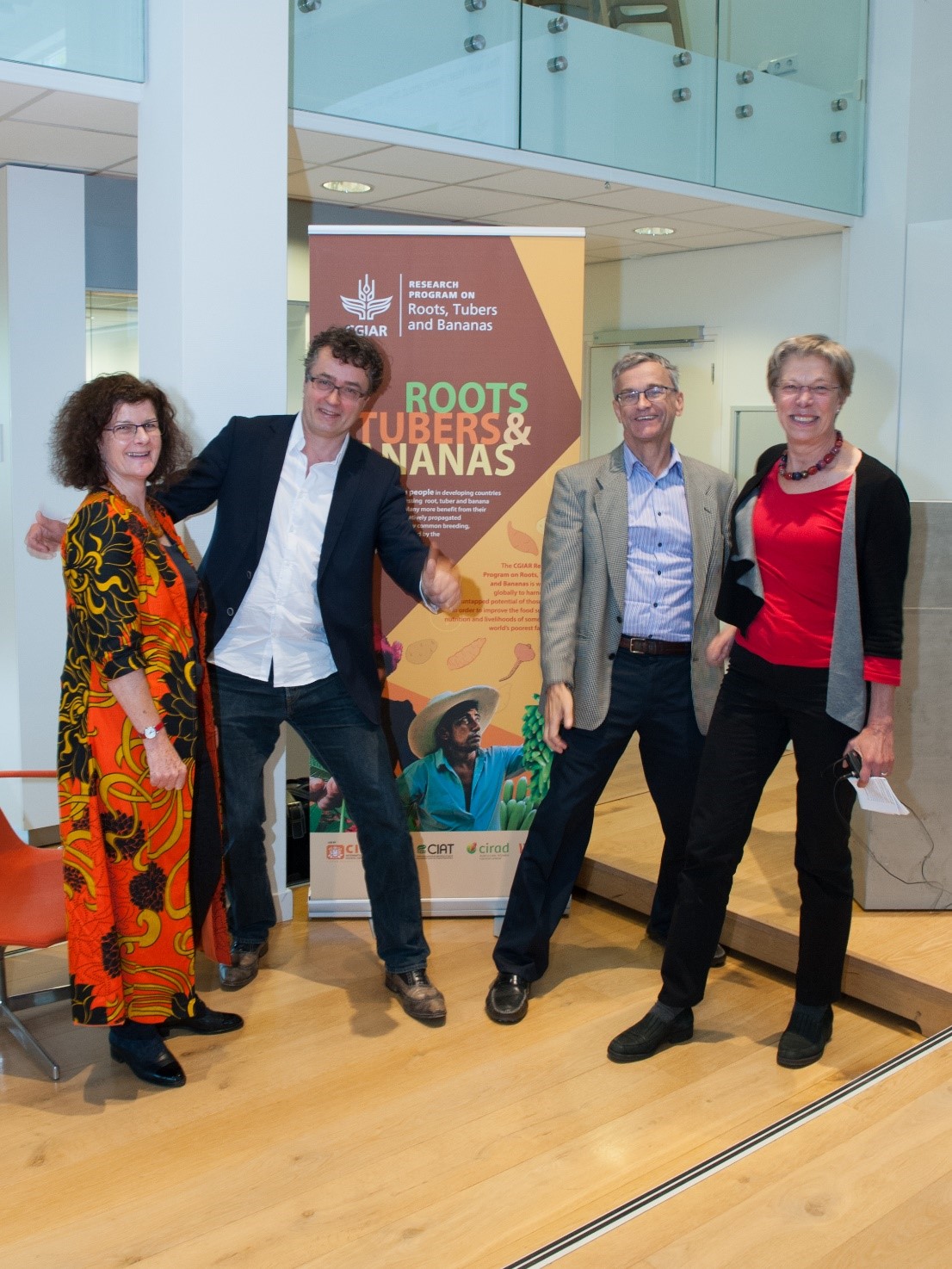
Enthusiasm at a launch event on May 11, 2017, marking a new phase in the collaboration between WUR and RTB. Photo credit M. Hendriks
The seed system toolbox
Conny Almekinders, Associate Professor at WUR, is enthusiastic about the benefits for all concerned. “Having postgraduates doing their research in CGIAR projects is a wonderful opportunity from which everybody benefits. As academic supervisors, it enables us to be involved in cutting edge research for development, while the students build their networks and strengthen future collaboration.”
For example, PhD students examined collective management of late blight in potato and Xanthomonas wilt in banana, leading farmers to a deeper understanding of how important it is to act as a community. This and other research is part of WUR’s EVOCA project, which unites RTB, other CGIAR centers and research programs with partners in a broad interdisciplinary collaboration based on knowledge-sharing platforms that WUR calls Environmental Virtual Observatories for Connective Action.
One of the first collaborations with WUR developed the multi-stakeholder framework for interventions in RTB seed systems, a key to much of our work. Planting material for all RTB crops shares certain characteristics. ‘Seeds’ are often bulky and perishable, and although farmers can easily produce their planting material, the accumulation of pathogens can result in a loss of yield, while shared planting material can spread invasive pests and diseases rapidly.
WUR partners helped to expand and improve the RTB seed system toolbox. With seed tracing studies, it became possible to see, for example, how wealthy farmers were instrumental in the spread of new potato varieties in Ethiopia, because they shared their seed more widely than other farmers. An extension of this work focused on looking at seed flows to optimize monitoring pests and diseases and thereby limit their spread.
Seed systems are especially important for RTB crops as we seek to understand why farmers are often reluctant to adopt new varieties. Part of the problem is that in the past there was little systematic data collection from farmers and a distinct lack of pathways to feed that intelligence back into breeding programs. RTB has built gender-responsive tools to gather data and ensure that it becomes part of breeding programs and enhanced product profiles. Building on work with RTB, WUR partners suggest that One CGIAR tap into Dutch expertise in seed systems to drive responsible seed system transformation. The goal is locally-adapted seed systems that are inclusive and equitable, can rapidly scale the distribution of new varieties and clean seed, and can respond to socially differentiated demands.
Linking systems analysis tools
RTB and partners from WUR have developed a flexible set of calculation tools and data to quantify agroecosystem performance in terms of a range of indicators such as farm productivity, household nutrition, socio-economic factors and environmental quality. These tools and data support the design of sustainable agricultural systems that serve food security, equitable livelihoods and a healthy environment and that are resilient to emerging challenges, including climate change and shifts in food demand.
So far, we have used these systems analysis tools for a study in Uganda, where we looked at the multidimensional impact of plant disease and climate change on banana cropping systems. Results indicated that increased agrobiodiversity could reduce farmers’ vulnerability and increase their adaptive resilience. We have also used the models to explore the potential of nutrition-sensitive agriculture to reduce smallholder vulnerability while contributing to whole-farm productivity and environmental performance. This analysis identified options based on crop composition and management configurations that would satisfy household dietary needs and improve incomes.
Questions of scale
One very fruitful collaboration between RTB and WUR has been in scaling. Dutch institutes have long been at the forefront of research into scaling and in 2017, at the start of RTB Phase 2, WUR partners took on the leadership of RTB Flagship Project 5 – Improved livelihoods at scale.
Scaling is fundamental to system transformation, which depends on the uptake of multiple interdependent changes by different actors at different levels and in different spheres. CGIAR has achieved scale in some areas, such as genetic innovations, but overall the idea of scaling readiness has not been fully embedded in CGIAR thinking. RTB and partners at WUR have together built tools to enable a formal, systems approach to assess scaling readiness of innovation packages that will support the development of better strategies to achieve impact at scale.
Within RTB, FP5 helps scientists in the other flagship projects to target their research, especially for youth and gender, and to select partners. The goal is to ensure that whatever we do, we develop the capacity to improve livelihoods at scale. This requires research into practical scaling, and also into the factors conducive to successful scaling. Together, RTB and WUR partners tackle both aspects.
We have already seen not only successes in RTB’s own efforts to scale up research, as with the adoption of orange-fleshed sweetpotato in Africa, but also with the processes and tools we developed with partners at WUR, many of which were explored in a special issue of the journal Agricultural Systems edited jointly by RTB and WUR partners.
“Partnership is a crucial aspect of our success,” said Graham Thiele, RTB director. “We look forward to partnering even more closely with people at WUR as we all work to embed effective scaling into the One CGIAR research portfolio.”
